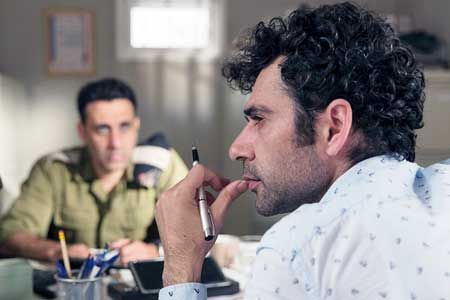Film (2018)
Directed by Sameh Zoabi
Screenplay by Dan Kleinman, Sameh Zoabi
Kendall Square Cinema, Cambridge, MA
West Newton Cinema, Newton, MA
With Kais Nashif (Salam Abbass), Lubna Azabal (Tala / Manal aka Rachel), Yaniv Biton (Captain Assi Tzur), Maisa Abd Elhadi (Mariam), Nadim Sawalha ( Bassam), Salim Dau (Atef), Yousef ‘Joe’ Sweid (General Yehuda Edelman), Amer Hlehel (Nabil), Ashraf Farah (Marwan), Laëtitia Eïdo (Maisa)

Kais Nashif as Salam
in “Tel Aviv on Fire”
Image: Courtesy of Cohen Media Group
Salam (Kais Nashif) is an assistant on the set of Tel Aviv on Fire, a popular television series set in Israel just before the Six Day War. In the television series Tala (Lubna Azabal) plays Manal, a Palestinian spy who is in love with another Palestinian named Marwan (Ashraf Farah) but who pretends to be an Israeli named Rachel who gets romantically involved with an Israeli army officer, General Yehuda Edelman (Yousef ‘Joe’ Sweid).
Salam puts in his two cents about some things in the script and before long is a script writer. To add to the mix, his very funny and sometimes scary dealings with an Israeli checkpoint officer, Captain Assi Tzur (Yaniv Biton) also lead to unexpected contributions to the script. As well, Salam pursues his old love, Mariam (Maisa Abd Elhadi), whose words he commemorates in writing to great effect.
This subtle comedy is beautifully written and acted, directed by a Palestinian, co-written by him and a Jewish-American, and sponsored by a Israel-France-Luxembourg collaboration. It is funny and heartbreaking, and while remaining a comedy, pulls no punches about the history of Israeli and Palestinian relations.
How those relations are perceived and felt are constantly worked over in the script for the television show within the film. How to balance romance, deception, resolution and continuation become central to the challenge Salam, as writer, has before himself.
In addition, he has to keep the star actress, Tala, happy, so that the script enables her to feel vital. And, as well, he has to keep his uncle, Bassam (Nadim Sawalha), who happens to be the producer of the show and an ardent Palestinian nationalist, happy, which is not so easy either.
As Salam, Kais Nashif has a wonderful, almost offhand, demeanor. Desperately trying to reconnect with Mariam, the old girlfriend for whom he is still pining, he’s constantly ardent but with an understated charm. With Tala, the actress, he also has to be deft yet unreactive. And that is especially true with Assi, his Israeli checkpoint officer, who threatens him at every turn but has a passionate attachment to the television show and lots of strong feelings about how it should evolve.
In addition to Kais Nashif’s superbly subtle rendering of Salam, the acting, all around, is very good. As Tala, Lubna Azabal, is beautifully vain and intense, and, as Assi, Yaniv Biton is hilariously obsessed. And, as Mariam, Maisa Abd Elhadi is wonderful as an appealing but a self-possessed romantic counterpart to Salam.
The premise, that Palestinians and Israelis are engaged in a collaborative effort to write a show about themselves, is a very clever one. Depicted as the crux of the television show within the film it gives the opportunity to see the challenge of the Middle East as one of both narrative and negotiation. That premise is also clearly self-referential about the making of the film Tel Aviv on Fire itself, which is a collaboration between Israelis and Palestinians, overseen by a Palestinian director.
The result is not only entertaining and charming but moving as well. The sly subtext of the film is that narrative and creativity represent a great deal, and embarked upon collaboratively, they can become vehicles for a story which is engaging and moving to both sides.
Don’t be fooled by the thought that this is a simple, inadvertent romantic comedy. On the one hand, it is; and, on the other, it is a far more significant work within. That combination, reminiscent of the greatest of Shakespearean comedies, enables one to laugh, and to take heart in a penetrating vision at the same time.
– BADMan
Hi Charlie,
The tone of your review in an interesting way raises hope. That not every examination of the Israeli-Palestinian conflict is heavy and gloomy itself raises one’s spirit.
Thank you for a characteristically Charlie-esque review.
All the best always — and in all ways.
Rougelach . . . I mean, Danish.